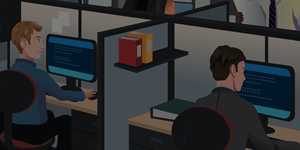
Every day, cyber-criminals are becoming more and more sophisticated and it seems as if for every milestone achieved in cyber-security, hackers are coming up with more ways around them.
A successful cyber-attack can be hugely damaging to a business – especially newer businesses who have yet to establish their reputation. A data breach which results in your business’ and/or customers’ details becoming compromised could destroy the trust your customers’ have in you, in turn destroying your reputation.
Below is a list of steps you can take to minimise the chances of your business falling victim to a cyber-criminal.
Keep cybersecurity software updated - Having cyber-security software implemented should go without saying. However, just having software in place won’t be protecting your systems if it is not kept updated.
Cyber-security software is updated regularly by the companies who create it in order to keep it able to fight off the latest threats – not having the latest version implemented in your business means cyber-criminals are likely to be able to find a way around it and penetrate your systems and networks.
Some anti-virus software will routinely update on its own, however not all programs have this ability. You need to check all major programs at least once a month to check there are no vulnerabilities that criminal could take advantage of.
Staff training - When it comes to cyber-security, you are only as strong as your least informed employee. Cyber-criminals are smart – they will search until they find a weak point and will use it to exploit your business.
This is often through an employee who doesn’t know how to identify a phishing email or a hoax call or doesn’t use strong passwords. Making sure every one of your employees knows how they could be contacted and tricked by a hacker is essential in order to protect your organisation.
24/7 monitoring - Cyber-attacks can happen at anytime and, in fact, cyber-criminals are more likely to start their attack at a time when they know they can go undetected – through the night is common.
You can implement software which will send you alerts 24/7 of any unusual or suspicious activity which may be a sign that an attack in underway. There are also monitoring services you can look into where there are cyber-security experts who can spot these threats and act upon them immediately.
Access management – When you are assessing the access employees have to company tools and software, it is important to only allow them access to the components or functions they need to fulfil their job role. If an employee’s log-in details are stolen, for example, that means the hackers are only limited to what that employee can use and not the whole system, limiting the damage they can cause.
Effective response plan – For all the defences that you put into place, it is important to anticipate that they may not always be 100% effective and you need to be prepared for if and when an attack does get through.
Having a thorough plan in place will ensure that you can respond quickly to an attack which will help to minimise, or even stop, the damage. A good plan will include who will be notified first and what steps need to be taken, in what order and by whom.
Physical security – Although protecting your online presence is the most important, it’s essential not to forget about physically securing your workplace too. Sometimes criminals will find ways to access your company, perhaps pretending to be a customer or supplier, in order to steal valuable information.
Things like security cameras, coded door entry, and policies about supervising visitors are all steps you can take to protect your company from intruders.
Find it useful? Please share!
Find it useful? Please share!
Last updated: 23 January 2020 | © KIS Bridging Loans 2024 | Terms & Conditions